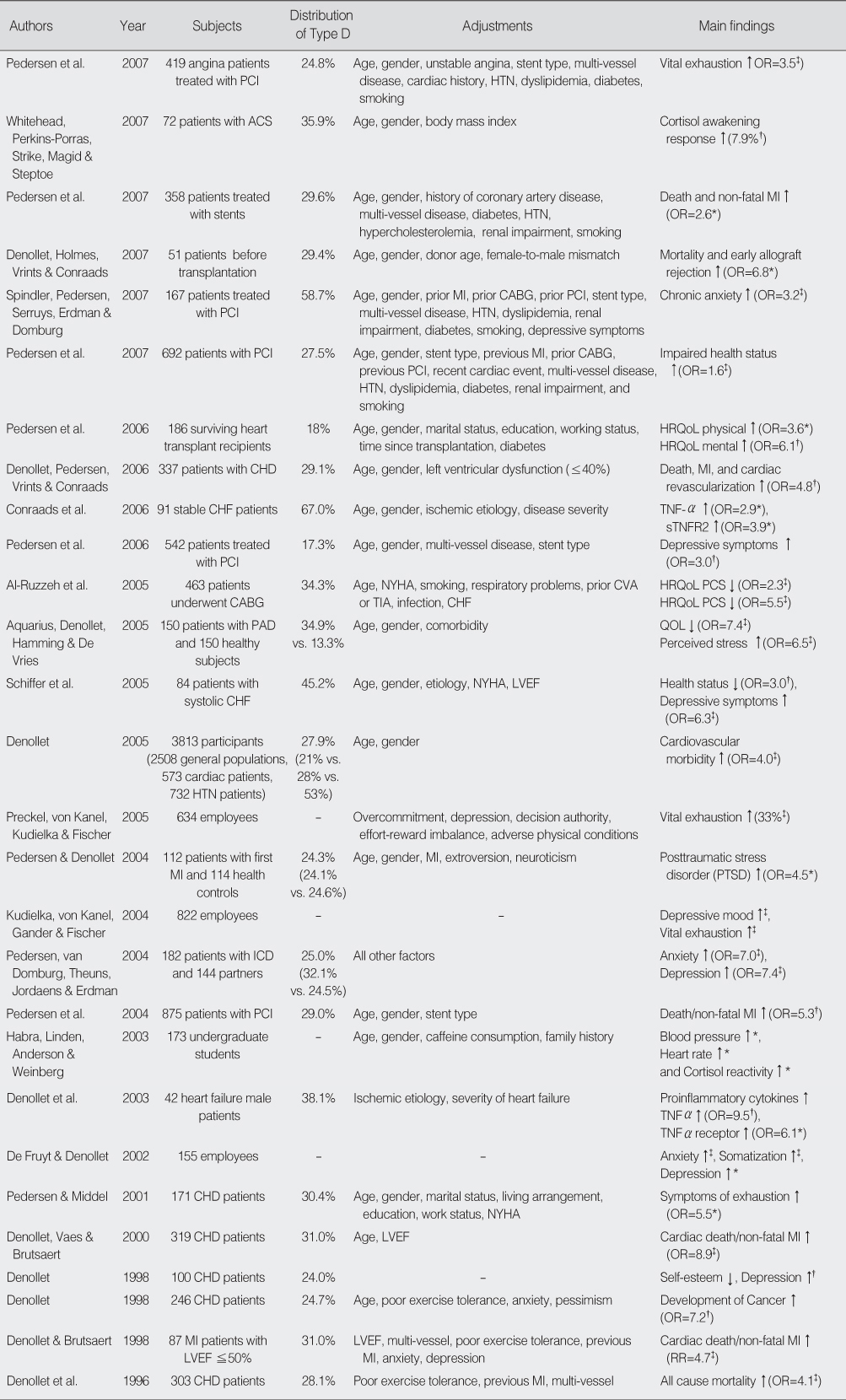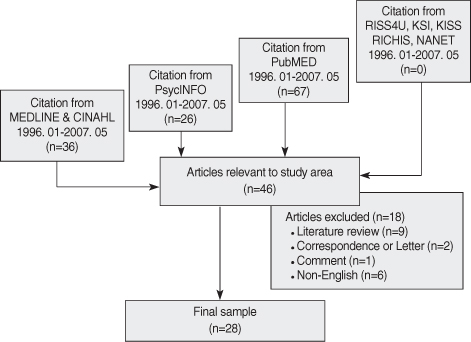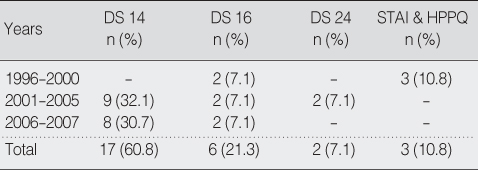Articles
- Page Path
- HOME > J Korean Acad Nurs > Volume 38(1); 2008 > Article
-
Original Article
- The Analysis of Type D Personality Research as a Psychosocial Risk Factor in Cardiovascular Disease for Elders with a Chronic Disease
- Eun Kyeung Song, Youn Jung Son
-
Journal of Korean Academy of Nursing 2008;38(1):19-28.
DOI: https://doi.org/10.4040/jkan.2008.38.1.19
Published online: February 28, 2008
1Part-time Lecturer, College Nursing, Yonsei University, Seoul, Korea.
2Assistant Professor, Department of Nursing, Soonchunhyang University, Cheonan, Korea.
- Address reprint requests to: Son, Youn Jung. Department of Nursing, College of Medicine, Soonchunhyang University, 366-1 Ssangyong-dong, Cheonan 330-946, Korea. Tel: 82-41-570-2487, Fax: 82-41-575-9347, yjson@sch.ac.kr
Copyright © 2008 Korean Society of Nursing Science
Abstract
-
Purpose
- The purpose of this paper was to examine the relationship between type D personality and cardiovascular disease, and to suggest future research directions.
-
Methods
- A literature search was conducted from the following nine databases: 1) MEDLINE, 2) CINAHL, 3) Pubmed Unrestricted, 4) PsycINFO, 5) KISS, 6) RICHIS, 7) RISS4U, and 8) Nanet. The combinations of the words, "type D personality", "personality", "heart", "cardiovascular", and "coronary" were used for keyword searches to find relevant articles. Twenty eight studies were identified.
-
Results
- Type D personality has been associated with increased morbidity and mortality in patients with established cardiovascular disease. Type D patients are also at increased risk for impaired quality of life, and seem to benefit less from medical and invasive treatment.
-
Conclusion
- There is substantial evidence for a relationship between type D personality and clinical outcomes related to cardiovascular disease. Randomized clinical trials are needed to further evaluate the value of controlling type D personality to improve survival and reduce morbidity in patients with cardiovascular disease. Accumulating evidence from this analysis indicates the urgent need to adopt a personality approach in order to optimize the identification of patients at risk for stress related cardiac events.
- 1. Angerer P, Siehert V, Kothny W, Mühlbauer D, Mudra H, von Schacky C. Impact of social support, cynical hostility and anger expression on progression of coronary atherosclerosis. J Am Coll Cardiol. 2000;36:1781–1788.ArticlePubMed
- 2. Aquarius AE, Denollet J, Hamming JF, De Vries J. Role of disease status and type D personality in outcomes in patients with peripheral arterial disease. Am J Cardiol. 2005;96:996–1001.ArticlePubMed
- 3. Berkman LF, Leo-Summers L, Horwitz RI. Emotional support and survival after myocardial infarction. A prospective, population-based study of the elderly. Ann Intern Med. 1992;117:1003–1009.ArticlePubMed
- 4. Bosma H, Peter R, Siegrist J, Marmot M. Two alternative job stress models and the risk of coronary heart diseas. Am J Public Health. 1998;88(1):68–74.ArticlePubMedPMC
- 5. Conraads VM, Denollet J, De Clerck LS, Stevens WJ, Bridts C, Vrints CJ. Type D personality is associated with increased levels of tumor necrosis factor (TNF)-alpha and TNFalpha receptors in chronic heart failure. Int J Cardiol. 2006;113(1):34–38.PubMed
- 6. Dembroski TM, Costa PT Jr. Coronary prone behavior: components of the type A pattern and hostility. J Pers. 1987;55:211–235.ArticlePubMed
- 7. Denollet J. Personality and coronary heart disease: the type-D scale-16 (DS 16). Ann Behav Med. 1998;20:209–215.ArticlePubMed
- 8. Denollet J. Type D personality a potential risk factor refined. J Psychosom Res. 2000;49:255–266.PubMed
- 9. Denollet J. DS 14: standard assessment of negative affectivity, social inhibition, and type D personality. Psychosom Med. 2005;67:89–97.ArticlePubMed
- 10. Denollet J, Conraads VM, Brutsaert DL, De Clerck LS, Stevens WJ, Vrints CJ. Cytokines and immune activation in systolic heart failure: the role of Type D personality. Brain Behav Immun. 2003;17:304–309.ArticlePubMed
- 11. Denollet J, De Potter B. Coping subtypes for men with coronary heart disease: relationship to well-being, stress and Type-A behavior. Psychol Med. 1992;22:667–684.ArticlePubMed
- 12. Denollet J, Sys SU, Brutsaert DL. Personality and mortality after myocardial infarction. Psychosom Med. 1995;57:582–591.ArticlePubMed
- 13. Erdam RA, Duivenvoorden HJ, Verhage F, Kazemier M, Hugenholtz PG. Predictability of beneficial effects in cardiac rehabilitation: a randomized clinical trial of psychosocial variables. J Cardiopulm Rehabil. 1986;6:206–213.
- 14. Friedman M, Rosenman RH. Association of specific overt behavior pattern with blood and cardiovascular findings: blood cholesterol level, blood clotting time, incidence of arcus senilis, and clinical coronary artery disease. J Am Med Assoc. 1959;169:1286–1296.PubMed
- 15. Habra ME, Linden W, Anderson JC, Weinberg J. Type D personality is related to cardiovascular and neuroendocrine reactivity to acute stress. J Psychosom Res. 2003;55:235–245.ArticlePubMed
- 16. Hemingway H, Marmot M. Evidence based cardiology: psychosocial factors in the aetiology and prognosis of coronary heart disease. Systematic review of prospective cohort studies. BMJ. 1999;318:1460–1467.ArticlePubMedPMC
- 17. Jenkins CD. Epidemiology of cardiovascular disease. J Consult Clin Psychol. 1988;56:324–332.PubMed
- 18. Lett HS, Blumenthal JA, Babyak MA, Sherwood A, Strauman T, Robins C, et al. Depression as a risk factor for coronary artery disease: evidence, mechanism and treatment. Psychosom Med. 2004;66:305–315.PubMed
- 19. Linden W, Stossel C, Maurice J. Psychosocial interventions for patients with coronary artery disease: a meta-analysis. Arch Intern Med. 1996;156:745–752.ArticlePubMed
- 20. Medina MA, Amores-Sánchez MI. Homocysteine: an emergent cardiovascular risk factor? Eur J Clin Invest. 2000;30:754–762.ArticlePubMedPDF
- 21. Moser DK, Dracup K. Is anxiety early after myocardial infarction associated with subsequent ischemic and arrhythmic events? Psychosom Med. 1996;58:395–401.ArticlePubMed
- 22. Pedersen SS, Denollet J. Type D personality, cardiac events, and impaired quality of life: a review. Eur J Cardiovasc Prev Rehabil. 2003;10:241–248.ArticlePubMed
- 23. Pedersen SS, Middel B. Increased vital exhaustion among type-D patients with ischemic heart disease. J Psychosom Res. 2001;51:443–449.ArticlePubMed
- 24. Pedersen SS, van Domburg RT, Theuns DA, Jordaens L, Erdmanm RA. Type D personality is associated with increased anxiety and depressive symptoms in patients with an implantable cardioverter defibrillator and their partner. Psychosom Med. 2004;66:714–719.PubMed
- 25. Ravaja N, Kauppinen T, Keltikangas-Jarvinen L. Relationships between hostility and psychological coronary heart disease risk factors in young adults: the moderating influences of depressive tendencies. Psychol Med. 2000;30:381–393.ArticlePubMed
- 26. Rozanski A, Blumenthal JA, Kaplan J. Impact of psychological factors on the pathogenesis of cardiovascular disease and implications for therapy. Circulation. 1999;99:2192–2217.ArticlePubMed
- 27. Schiffer AA, Pedersen SS, Widdershoven JW, Hendriks EH, Winter JB, Denollet J. The distressed (type D) personality is independently associated with impaired health status and increased depressive symptoms in chronic heart failure. Eur J Cardiovasc Prev Rehabil. 2005;12:341–346.ArticlePubMedPDF
- 28. Smith TW, Ruiz JM. Psychosocial influences on the development and course of coronary heart disease: current status and implications for research and practice. J Consult Clin Psychol. 2002;70:548–568.ArticlePubMed
- 29. Spielberger CD, Van Der Ploeg HM, Defares PB. ZBV: A Dutch-Language adaptation of the Spielberger State-Trait Anxiety Inventory. 1980;Lisse, The Netherlands, Swets & Zeitlinger.
- 30. Watson D, Clark LA, Harkness AR. Structures of personality and their relevance to psychopathology. J Abnorm Psychol. 1994;103:18–31.ArticlePubMed
REFERENCES

ACS=acute coronary syndrome; CABG=coronary artery bypass graft; CHD=coronary heart disease; CHF=congestive heart failure; CVA=cerebral vascular attack; HPPQ=heart patients psychological questionnaire; HRQoL=health related quality of life; HTN=hypertension; ICD=implantable cardioverter defibrillator; LVEF=left ventricular ejection fraction; MCS=mental component summary; MI=myocardial infarction; NYHA=new york heart association; PCI=percutaneous coronary intervention; PCS=physical component summary; STAI=spielberger state-trait anxiety inventory; TIA=transient ischemic attack; TNF-α=tumor necrosis factor α; sTNFR2=soluble tumor necrosis factor receptor 2. *p<0.05; †p<0.01; ‡p<0.001.
Figure & Data
REFERENCES
Citations

- Associations between type D personality, moral disengagement, and cyber aggression among university students
Haeyoung Lee, Sun Joo Jang
Current Psychology.2023; 42(15): 12648. CrossRef - Associations of eating alone with type D personality, depression and rejection sensitivity among South Korean university students
Eunmi Lee, Yujeong Kim, Haeyoung Lee
Perspectives in Psychiatric Care.2020; 56(2): 256. CrossRef - Impact of Type D Personality on Depression, Anxiety, and Health-related Quality of Life among Coronary Artery Disease Patients: A Systematic Review and Meta-analysis
Sun Hyoung Bae, Jin-Hee Park
Korean Journal of Adult Nursing.2019; 31(3): 219. CrossRef - Comparisons of Clinical Practicum Stress, Depression, and Self-Efficacy among Nursing Students: Focusing on Type D Personality and non-Type D Personality
Mi Hyeon Seong, Ok Sun Kim, Youn Ok Jung, Sohyune Sok
Journal of Korean Academy of Psychiatric and Mental Health Nursing.2017; 26(3): 217. CrossRef - Association among type D personality, non-motor symptoms, and quality of life in Parkinson's disease: A cross-sectional study
Sung Reul Kim, Ji Young Kim, Hyun Kyung Kim, Kyeung Eun Lim, Mi Sun Kim, Sun Ju Chung
Geriatric Nursing.2017; 38(5): 431. CrossRef - The Mediating Effect of the Resilience on the Relationship between Type D Personality and Compliance in Patients with Coronary Artery Disease
Mi Young Cheon, Jiyeon Kang
Korean Journal of Adult Nursing.2016; 28(1): 61. CrossRef - Does type D personality affect symptom control and quality of life in asthma patients?
Sung Reul Kim, Hyun Kyung Kim, Jeong Hee Kang, Seok Hee Jeong, Hye Young Kim, So Ri Kim, Mi Young Kim
Journal of Clinical Nursing.2015; 24(5-6): 739. CrossRef - The Relationship between Type D Personality and Suicidality in Low-Income, Middle-Aged Adults
Dae Hyun Yoon, Seog Ju Kim, Jong-Ha Lee, Pyo-Min Kim, Doo-Heum Park, Seung Ho Ryu, Jaehak Yu, Jee Hyun Ha
Psychiatry Investigation.2015; 12(1): 16. CrossRef - Effects of Type D Personality on Compassion Fatigue, Burnout, Compassion Satisfaction, and Job Stress in Clinical Nurses
Sung Reul Kim, Hye Young Kim, Jeong Hee Kang
Journal of Korean Academy of Nursing Administration.2014; 20(3): 272. CrossRef - Factors Influencing Type D Personality of Female Undergraduate Students Majoring in Nursing
Jun Hee Noh, Eun Ju Lim, Yong-Sun Jeong
Journal of the Korea Academia-Industrial cooperation Society.2013; 14(12): 6265. CrossRef - Influence of Type D personality on health‐related quality of life among Korean patients with end‐stage renal disease
Youn‐Jung Son, Mi‐Ae You, Eun Kyeung Song
International Journal of Nursing Practice.2012; 18(3): 260. CrossRef - A Comparison of the Health Status and Health Promoting Behaviors between Type D Personality and Non-Type D Personality in Middle aged Women
Sun Hyoung Bae, Jin-Hee Park, Euigeum Oh
Korean Journal of Women Health Nursing.2011; 17(4): 337. CrossRef - Anti-obesity Effect of Monascus pilosus Mycelial Extract in High Fat Diet-induced Obese Rats
Sang-Il Lee, Jae-Won Kim, Ye-Kyung Lee, Seung-Hwan Yang, In-Ae Lee, Joo-Won Suh, Soon-Dong Kim
Journal of Applied Biological Chemistry.2011; 54(3): 197. CrossRef - Quality of Life and Illness Intrusiveness by Type-D Personality in the Patients with Coronary Artery Disease
Haeng-Mi Son
Journal of Korean Academy of Nursing.2009; 39(3): 349. CrossRef

Figure 1
Published years, Sources, Study Design, and Characteristics of Subjects (N=28)
CAD=coronary artery disease; CHF=congestive heart failure; HTN=hypertension; PAD=peripheral artery disease.
Instruments for Measurement of Type D Personality (N=28)
DS=D scale; STAI=state-trait anxiety inventory; HPPQ=heart patients psychological questionnaire.
Chronological View of Studies Published on the Type D Personality Construct
ACS=acute coronary syndrome; CABG=coronary artery bypass graft; CHD=coronary heart disease; CHF=congestive heart failure; CVA=cerebral vascular attack; HPPQ=heart patients psychological questionnaire; HRQoL=health related quality of life; HTN=hypertension; ICD=implantable cardioverter defibrillator; LVEF=left ventricular ejection fraction; MCS=mental component summary; MI=myocardial infarction; NYHA=new york heart association; PCI=percutaneous coronary intervention; PCS=physical component summary; STAI=spielberger state-trait anxiety inventory; TIA=transient ischemic attack; TNF-α=tumor necrosis factor α; sTNFR2=soluble tumor necrosis factor receptor 2. *p<0.05; †p<0.01; ‡p<0.001.
CAD=coronary artery disease; CHF=congestive heart failure; HTN=hypertension; PAD=peripheral artery disease.
DS=D scale; STAI=state-trait anxiety inventory; HPPQ=heart patients psychological questionnaire.
ACS=acute coronary syndrome; CABG=coronary artery bypass graft; CHD=coronary heart disease; CHF=congestive heart failure; CVA=cerebral vascular attack; HPPQ=heart patients psychological questionnaire; HRQoL=health related quality of life; HTN=hypertension; ICD=implantable cardioverter defibrillator; LVEF=left ventricular ejection fraction; MCS=mental component summary; MI=myocardial infarction; NYHA=new york heart association; PCI=percutaneous coronary intervention; PCS=physical component summary; STAI=spielberger state-trait anxiety inventory; TIA=transient ischemic attack; TNF-α=tumor necrosis factor α; sTNFR2=soluble tumor necrosis factor receptor 2. *p<0.05; †p<0.01; ‡p<0.001.
 KSNS
KSNS
 E-SUBMISSION
E-SUBMISSION



 Cite
Cite

